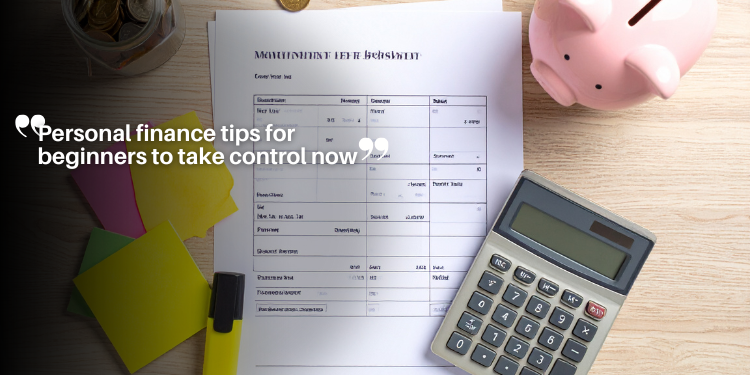Personal finance tips for beginners to take control now

Personal finance tips for beginners include building an emergency fund, setting realistic budgeting goals, and exploring beginner-friendly investment options to enhance financial security and growth.
Personal finance tips for beginners are essential for anyone looking to master their money management skills. Have you ever felt overwhelmed by financial decisions? Don’t worry; you’re not alone. Let’s explore some crucial strategies that can guide you!
Understanding basic financial concepts
Understanding basic financial concepts is crucial for anyone looking to improve their money management skills. Many people feel lost when it comes to handling their finances, but don’t worry! We’re here to break it down in simple terms.
Key Terms to Know
To get started, let’s highlight some essential financial terms that will help you navigate your financial journey.
- Budget: A plan that outlines your income and expenses.
- Expenses: The money you spend on necessities and wants.
- Income: The money you earn from work or other sources.
- Debt: Money that you owe to others.
Understanding these terms is your first step toward financial literacy. Now, let’s explore why budgeting is vital for financial health.
The Importance of Budgeting
Budgeting helps you track where your money goes. By knowing your income versus your expenses, you can make informed choices. For example, if you don’t know your spending habits, you could easily find yourself in debt. A reasonable budget can prevent this!
Creating Your First Budget
To create your first budget, follow these simple steps:
- List all your sources of income.
- Track your monthly expenses.
- Allocate funds for savings and necessities.
- Review and adjust your budget monthly.
The goal is to ensure your income covers your expenses and allows for savings. Understanding basic financial concepts makes budgeting easier and more effective.
With these fundamentals, you’re now equipped to tackle your finances with confidence. Keep learning, and don’t hesitate to seek advice or use tools to help you.
Setting realistic budgeting goals
Setting realistic budgeting goals is essential for achieving financial stability. When you have clear and achievable goals, it’s easier to manage your money effectively. Let’s explore how to create budgeting goals that work for you.
Know Your Income
The first step is to understand how much money you earn each month. This includes your salary, bonuses, or any side income. Once you have this figure, you can start to allocate it towards your expenses and savings. Knowing your total income is vital for realistic budgeting.
Identify Your Expenses
Next, list your expenses. This involves identifying fixed costs like rent or mortgage payments, as well as variable expenses like groceries and entertainment. By knowing what you need to pay each month, you can create a more precise budget. Keep track of every dollar spent to see where your money goes.
Setting Specific Goals
When you set budgeting goals, it helps to be specific. For instance, instead of saying, “I want to save more money,” you could set a goal like, “I want to save $200 a month.” This measurable goal gives you a clear target to aim for.
- Think about short-term and long-term goals.
- Incorporate savings for emergencies.
- Include fun money for activities you enjoy.
- Adjust goals as needed based on changes in your life.
Remember that goals should be attainable. If you’re currently spending more than you earn, a goal to save 50% of your income might not be realistic. Start small, and gradually increase your savings amount as you get more comfortable.
Evaluating your progress is also key. Check in monthly to see how well you’re tracking your financial goals. If you notice you’re falling behind, assess your budget and make necessary adjustments to get back on track.

Building an emergency fund
Building an emergency fund is a critical step in ensuring financial security. An emergency fund acts as a safety net, helping you handle unexpected expenses, like car repairs or medical bills, without going into debt. Let’s discuss how to create a solid emergency fund.
Why You Need an Emergency Fund
Life is unpredictable, and having an emergency fund can reduce stress during tough times. This fund should ideally cover three to six months’ worth of living expenses. With this safety net, you can face financial challenges without panic.
How to Start Saving
Begin by setting a specific savings goal. Calculate your monthly expenses and determine how much you want in your emergency fund. Next, automate your savings. Set up a separate savings account and transfer a fixed amount each month automatically. This makes saving easier and consistent, helping you reach your goal faster.
- Start small if needed; even $50 a month adds up over time.
- Cut unnecessary expenses to boost your savings.
- Consider using tax refunds or bonuses to jump-start your fund.
- Review your budget regularly to adjust your savings goal.
Once you reach your initial goal, keep saving. Aim to grow your fund until you have enough to cover three to six months of expenses. Remember, it is essential to maintain this fund for emergencies only.
If you dip into it, make a plan to replenish the fund as soon as possible. Building an emergency fund not only protects you but also gives you peace of mind knowing that you are prepared for the unexpected.
Exploring investment options for beginners
Exploring investment options for beginners is an important step for building wealth over time. Investing can seem overwhelming, but starting is easier than you think. Here, we’ll break down the basics and provide simple options for beginners.
Understanding Different Types of Investments
There are various types of investment options available. Let’s look at a few main categories that are beginner-friendly:
- Stocks: Buying shares in a company, allowing you to profit from its growth.
- Bonds: A loan to a company or government that pays you interest over time.
- Mutual Funds: A pool of money from various investors used to buy a diverse portfolio of stocks and bonds.
- Exchange-Traded Funds (ETFs): Collections of stocks or bonds that trade like a single stock on an exchange.
By understanding these options, you can choose what fits your financial goals. Stocks tend to offer higher returns but come with more risk. On the other hand, bonds are generally safer but provide lower returns.
Starting Your Investment Journey
To begin investing, first assess your financial situation. Determine how much money you can set aside for investments without affecting your daily expenses. A good rule of thumb is to invest money that you won’t need for at least five years.
It is also wise to open an investment account. There are many brokers today that cater to beginners with low fees and user-friendly platforms. When investing, consider dollar-cost averaging; this strategy involves investing a fixed amount regularly, making the process simpler and less stressful.
Research and Education
Before making any investment, it’s essential to educate yourself. Use resources such as books, websites, and online courses. Understanding the risks involved and how different investment options work will empower you in your financial decisions. As you learn, you’ll gain the confidence to make informed choices.
Remember, the key to successful investing is patience and persistence. As you explore investment options for beginners, take your time to understand each choice and start building your financial future.
FAQ – Frequently Asked Questions about Personal Finance and Investment
What is an emergency fund and why is it important?
An emergency fund is money set aside to cover unexpected expenses, providing financial security and peace of mind during emergencies.
How can I start setting a budget?
To start budgeting, track your income and expenses, set realistic saving goals, and review your budget regularly to adjust as needed.
What are some beginner-friendly investment options?
Beginner-friendly investment options include stocks, bonds, mutual funds, and ETFs, which can help you grow your money over time.
How do I educate myself about personal finance?
You can educate yourself through books, online courses, finance blogs, and videos that cover various topics about budgeting, saving, and investing.







